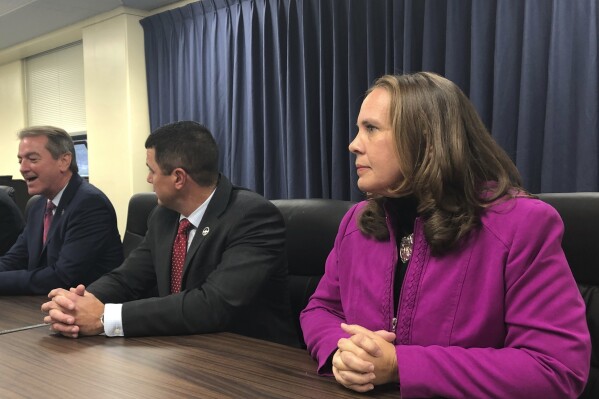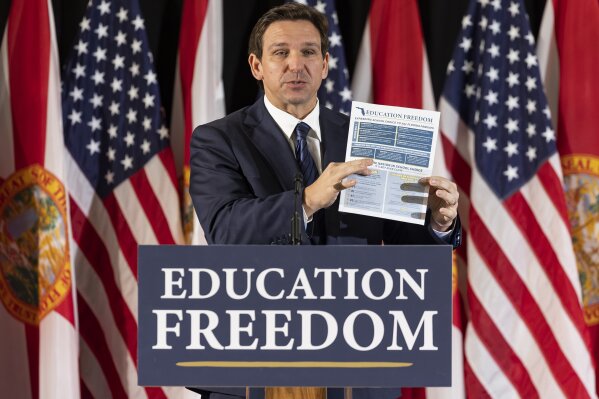Kentucky House passes a bill aimed at putting a school choice constitutional amendment on the ballot
FRANKFORT, Ky. (AP) — Supporters of letting Kentucky voters decide the outcome of a school choice constitutional amendment cleared a key hurdle Wednesday when the state House gave its support, after a tense debate that could foreshadow a bruising campaign ahead if the proposal reaches the ballot.
After an hourslong debate, the House passed the measure on a 65-32 vote to send it to the Senate. Republicans have supermajorities in both chambers. The House vote came a day after a GOP-led House committee advanced the bill.
With no election for statewide office on Kentucky’s ballot this November, school choice looms as the most hotly debated state issue during the fall campaign if the proposed amendment reaches the ballot.
“This is a turning point in the direction of the commonwealth of Kentucky, the education of our children and the future of this commonwealth,” said Democratic state Rep. George Brown Jr., who opposed the bill.
Opponents repeatedly tried to draw the bill’s lead Republican sponsor into discussing what policy actions would happen next if voters were to ratify the measure seeking to amend Kentucky’s constitution.



Republican state Rep. Suzanne Miles responded that the House debate should be confined to whether the proposal should be placed on the ballot. Several times, Republican House Speaker David Osborne halted attempts to discuss potential policy consequences if voters approved the constitutional amendment.
“This is not a policy decision,” Miles said. “There is no funding in this bill whatsoever. There’s no enabling legislation. This is solely a constitutional amendment to put on the ballot.”
When Democratic state Rep. Tina Bojanowski raised the prospect that it would lead to school vouchers, she was instructed by Osborne to confine her comments to the bill being debated.
After a long pause, she replied: “It’s very difficult to discuss a constitutional amendment that will impact significantly our public schools without discussing potential legislation that may occur with this. I think the people need to know.”
When another Democrat asked Miles what she would like to see happen if the amendment passes in November, Miles replied: “I would like to see every child in the commonwealth of Kentucky to have the very best access and level playing field to succeed to the best of their ability and live the American dream.”
The bill’s foes said public schools would suffer if the amendment won voter ratification. They predicted that follow-up school choice legislation would divert money from public schools already in need of greater state support for priorities like teacher raises and more transportation funding.
If ratified by voters, the proposal would give future legislatures the option to “provide financial support for the education of students outside the system of common schools″ — a reference to public schools.
For instance, it would remove constitutional barriers that have blocked the state from assisting parents who want to enroll their children in private or charter schools.
Courts in Kentucky have ruled that public tax dollars must be spent on the state’s “common” schools and cannot be diverted to charter or private schools. School choice advocates are hoping to surmount those legal hurdles by getting the school choice bill ratified on the fall ballot.
The political fight over school choice has been waged for years in Kentucky, but it would ratchet up significantly if the measure reaches the ballot.
The Kentucky Education Association — a labor association representing tens of thousands of public school educators — has signaled it’s ready to fight back against any school choice proposal. The KEA has a powerful ally in Democratic Gov. Andy Beshear, who has promised to join the fight. Beshear won a convincing reelection victory last November in Republican-leaning Kentucky.
The push for a constitutional amendment gained steam after the courts struck down school choice laws.
In 2022, Kentucky’s Supreme Court struck down a measure passed by GOP lawmakers to award tax credits for donations supporting private school tuition.
Last year, a circuit court judge rejected another measure to set up a funding method for charter schools. The decision stymied efforts to give such schools a foothold in the Bluegrass State. Those schools would be operated by independent groups with fewer regulations than most public schools.
Disclaimer: The copyright of this article belongs to the original author. Reposting this article is solely for the purpose of information dissemination and does not constitute any investment advice. If there is any infringement, please contact us immediately. We will make corrections or deletions as necessary. Thank you.




